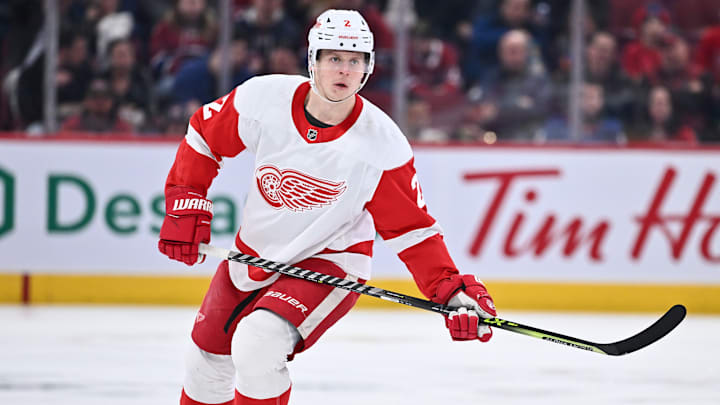I promised my colleague Kaitlyn that I'd be reasonable when discussing the fresh-to-death Finn, as she likes to refer to veteran defenseman Olli Määttä.
The two-time Stanley Cup winner has become somewhat of a stabilizer among Detroit's backend over the past two seasons, often skating as the fifth or sixth defender anchoring the third pairing.
Määttä initially signed a one-year deal worth $2.25 million and, thanks to some reliable play, received a two-year extension from general manager Steve Yzerman for $3 million annually. Määttä excelled during the first half of year one paired with Filip Hronek.
They say opposites attract. The contrasting skill sets of that pairing complemented each other nicely. Hronek is more of an offensive-first defender who loves to jump up into the play and take risks, whereas Määttä is more of a stay-at-home, defensive-minded player. Unfortunately (or maybe not), that bromance ended ahead of the deadline when Yzerman sent Hronek to the Vancouver Canucks for a first-round pick in last year's draft, which ended up being Axel Sandin Pellikka the high-flying right-handed defender (via New York Islanders) along with a second-round choice that became Felix Nilsson.
This past season, Määttä found himself primarily paired with another offensive-first defender in Shayne Gostisbehere. The third pairing quickly became somewhat of an adventure in their own zone, mostly due to Gostisbehere's one-dimensional style of play. The veteran defender is a defensive zone liability, which adds a ton of stress to his partner during even strength situations, in this case, Määttä, but a special teams wizard when working on the power play. Gostisbehere led Detroit's backend last year with 56 points, 29 of which came with the man advantage.
Is Detroit Red Wings defenseman Olli Määttä a roadblock or bridge for the Detroit Red Wings?
Määttä, 29, is entering the final year of his current deal, and the question becomes, is he a roadblock or a stepping stone for the Detroit Red Wings?
The Detroit Red Wings currently have five NHL defensemen under contract, plus their best, Moritz Seider, a restricted free agent waiting for a massive extension. That said, Detroit also has Simon Edvinsson, who is expected to become a regular with the Red Wings next season, along with Albert Johansson, who is waiver-exempt and now waiting in the wings (no pun intended). The only unrestricted free agent on the backend from last season is Gostisbehere, and although he was lethal on the power play, I would expect his roster spot to go to Edvinsson. Now, I wouldn't rule out a reunion with Gostisbehere, but the Detroit Red Wings are expected to become a 'cap' team this offseason after they handle their business, extending Seider, Lucas Raymond, and others (Patrick Kane, David Perron), etc. This indicates Yzerman will need to look to move someone such as Justin Holl or a bad, high-priced forward contract like Andrew Copp to make it work.
Last season, Määttä led the Detroit Red Wings with a plus-14 rating while netting four goals and 18 points over 72 games while averaging just over 16 minutes per night. Määttä maintained a Corsi For Percentage of 47.6 last season to go with a Relative Corsi For Percentage of 2.3, a significant improvement from the -0.4% he provided the Red Wings with the year prior.
Määttä also vastly improved his Expected Goal differential this past season from his first year with the Red Wings. In year one, he produced a 44.3 xGF to 52.5 xGA for a -8.2 difference. This past season, things looked a lot different; his xGF slightly decreased to 40.8 but so did his xGA to 36.9, good for a 3.9 overall difference.
I wouldn't call Määttä a roadblock but more of a stopgap, knowing Detroit is projected (as of now) to roster Jeff Petry and Justin Holl. Määttä would be best utilized being paired with a young, up-and-coming defender such as Edvinsson or Johansson, but the problem is that all three are left-handed. If Määttä is able or comfortable playing his off-hand full-time, it could benefit Detroit in the short term. All you can ask from your third pairing is for stability, and Määttä brings that to any team he's on. He's not flashy, but he gets the job done and typically won't hurt you with many ill-advised plays.
